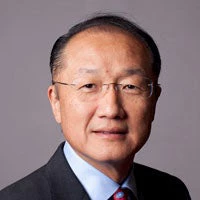
Two years ago today, I was honored and humbled to become president of the World Bank Group, whose mission – ending poverty – I have been working toward most of my life. One of my first questions for the World Bank economists was whether it would be possible to end extreme poverty, and if so, how long it would take. The answer came back that it would be difficult but possible to end extreme poverty by 2030.
Since then, the 188 countries that hold shares in the World Bank have endorsed this goal, which previously few people believed would ever be achievable, let alone in our lifetimes. And it’s been my mission to find the best ways to leverage the talent, knowledge, and influence of the Bank Group to make it happen.
I met with every department and we surveyed every employee about the organization’s strengths and weaknesses. What I found convinced me that we needed to reinvent ourselves. We needed to find a new business model that would allow us to more easily work together on development challenges. Basically, we needed to become a more tightly knit World Bank Group capable of helping countries leapfrog generations of trial and error so millions of people could emerge from poverty.
But first we had to change. Those of you who have been through a reorganization or led one know that change can be difficult, especially if the organization hasn’t gone through a change process in about two decades, as was the case with the World Bank Group. Your business goals may be different from ours, but your reasons for reinventing yourselves, and your experiences, are probably similar. Here are some crucial things we’re doing and why.
Break Silos
Our first order of business was to break down silos. Our structure has prevented us from fully leveraging expertise across the organization. Experts in health, education, energy, and other fields worked in their corner of the world and rarely crossed paths with their colleagues who were often working on the same kinds of problems. We had decades of experience solving problems, but the lessons we learned stayed in, for example, Latin America, though they might have helped Africa or another region. The answer: Keep our strong country presence, but reorganize so that expert technical staff would work together to provide the best global knowledge to all our clients.
We also weren’t tapping the full power of the World Bank Group, including the World Bank’s deep experience providing finance, advice, and capacity-building in some of the poorest countries in the world; the International Finance Corporation’s extensive knowledge of capital markets, the private sector, and ways to expand access to finance and spur entrepreneurship; or MIGA’s political risk insurance and credit enhancement work, which helps corporations enter new markets by guaranteeing investments. Instead, when the various parts of our organization have worked together, it has happened pretty much by accident. The answer: Bring the World Bank, IFC, and MIGA together to develop joint strategies for developing countries.
Reorganize Experts
Most importantly, we needed to help countries deliver solutions for their people. That’s different from simply sharing knowledge about best practices. To do this, we’ve organized experts into 19 groups, covering topics from climate change to trade. We’ve charged them with finding the best, most innovative solutions that can help even the poorest countries implement the best programs around energy, transport, education, health, and other sectors, and to do it with us at their side, helping them to actually deliver at the end of the day. Becoming an organization that will be the best in the world at helping countries and companies deliver the best development solutions is both our aspiration and our greatest challenge.
Foster the Forces that Reduce Inequality
Thomas Piketty’s influential book Capital in the 21 Century about rising inequality mentions two forces that seem to counter the trend toward an unequal world: diffusion of knowledge, and investment in people, namely, in their skills and training. I would add another area of investment that can reduce inequality – health. We now know that improvements in health can result in strong, inclusive economic growth. In fact, a Lancet commission of leading economists and health experts found that improvements in health accounted for 24% of growth in low- and middle-income countries between 2000 and 2011.
If a reinvented World Bank Group can improve our ability to spread knowledge and solutions from one corner of the world to another, we also will make headway on our other goal, “shared prosperity” – the idea that the benefits of economic growth should be shared by all. Better knowledge, advice, and know-how will help reduce inequality, as will solutions that improve education systems, job training programs, and encourage entrepreneurship.
If we are to have any hope of ending extreme poverty, we have to deliver. I’ll be monitoring my organization’s progress closely over the next year, to make sure we’re on the right track.
This is our reorganization story to date. I would be interested in hearing about your stories – both successes and failures. Please share them.


Join the Conversation